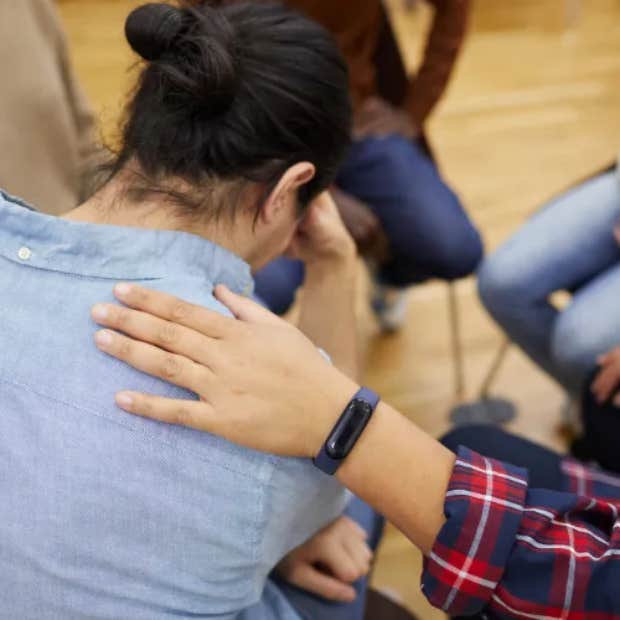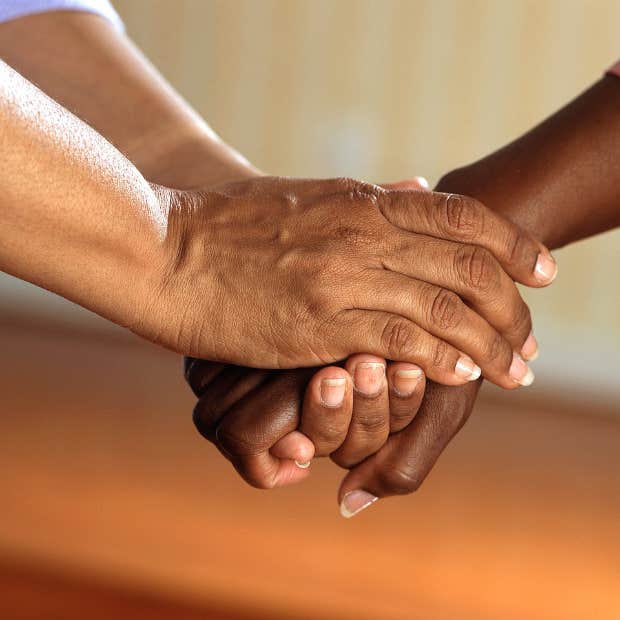I’ve Had It With Therapy. Here’s What I Really Need.
Therapy is not an antidote to the toxic forces in our society that are threatening our mental health.
 Getty Images | Unsplash
Getty Images | Unsplash Therapy can be a great tool for any challenging time in your life, or even as a way to grow during your best times. Stay tuned for some signs that it might be time to seek therapy.
It was hard for me not to smirk at the BetterHelp ad I heard on a recent episode of This American Life. Suffice to say, I’m less than enamored with therapy at the moment, and that’s not for lack of giving it a chance.
My family has spent hundreds of hours in therapy over the past year. I’ve spent nearly as much time trying to find therapists, filling out intake forms, scheduling appointments for various family members, and haggling with insurance companies.
It all started last fall when adolescence hit my daughter like a ton of bricks. Not long afterward, an immediate family member was diagnosed with a serious psychiatric disorder following a frightening mental health episode, and yet another began to struggle with deepening clinical depression.
While couples counseling and family counseling have been consuming several of my precious hours each week, people keep asking me if I’m taking care of myself, too.
I hate it when people ask me that. Society loves to tell caretakers to take care of ourselves without acknowledging that we are rarely granted the time or support to do so.
But the truth is, I’ve been fraying at the edges, starting to unravel. So I defaulted to beginning yet another exhausting search for a therapist who had an opening, lived a reasonable distance from my home, and accepted my insurance. Whether or not I would like or connect with this magical unicorn of a therapist was beside the point. If anyone met the elusive trifecta of availability, accessibility, and affordability, I’d consider myself lucky.
I never paused to consider whether talking about my problems in a vacuum to yet another stranger was really what I needed. But ultimately, it didn’t matter because I couldn’t find anyone anyway. I half-heartedly added myself to a few waitlists and abandoned my search.
During that time, the therapists that I’d so painstakingly lined up for the rest of my family began to fail us, one by one.
Just as I felt we were making progress, one left town for a three-week road trip, one double-booked us for two consecutive appointments, and another had to skip a week to attend a training. With so much going on, and so little time to process, just one missed appointment felt nothing short of catastrophic.
Of course, therapists, like all humans, deserve time off. They also deserve grace for occasional mistakes and opportunities for professional development. I hold no grudge against therapists as people or even against therapy as an industry. There are therapeutic techniques that I believe can be remarkably effective, particularly for more serious mental illnesses and disorders, and most of the therapists I’ve met have a genuine desire to help.
But also, let’s be real — who are we kidding? When we’re resting the collective mental health of our country on their shoulders, as it seems we are, is this patchwork, expensive, and difficult-to-access solution going to cut it? Are treating collective problems as individual problems helping us heal as a society?
My answer to these questions is a resounding NO. It’s not that I feel let down by any individual therapists. I feel let down by a society that isolates, exhausts, and exploits us, then sends us on a wild goose chase to piece together care options in our scant-free time that aren’t getting to the root of our needs.
Out of sheer desperation, I found a 12-step recovery group that meets weekly in a church basement.
A family member’s history of addiction is only one layer of the multi-tiered Challenge Cake I consume daily, but it made me eligible to show up and waltz right in.
Okay, I didn’t exactly waltz. I tentatively stood at the front of the church, puzzling over the locked door, until someone approached me and directed me around back. Then I descended the stairs to the basement, my heartbeat quickening a bit with each step.
Save for the courage to enter a room full of strangers, the group cost me nothing. To find it, all I did was a single Google search. It was 1.5 miles from my home and convened at 7 pm, after work and after dinner. I didn’t have to haggle with my insurance company or join a waitlist. I didn’t have to write five emails and leave three follow-up voice messages and maybe receive one reply a week or two later. I didn’t have to take time off work to attend. I didn’t have to sit in traffic while traveling clear across the city or to an adjoining suburb.
Even though I’m not sure what I expected, the meeting was nothing like I’d expected.
Perhaps I envisioned walking into a room full of people who looked as hopeless and broken-down as I felt. Perhaps I thought we’d spend the hour commiserating over our bad misfortune and wallowing in our victimhood. Perhaps I feared we might be preached to or given yet another intentional dialogue to practice that would inevitably elude me in real life.
But the meeting involved none of those things. I was shocked by how few people even mentioned the person in their lives who was struggling with addiction. There seemed to be endless ways to apply the 12 steps and recovery principles to nearly every aspect of life.
And when I left, even though I’d broken down crying in a room full of strangers, I felt better than I had in weeks. Months.

Photo: SeventyFour/Getty Images
I’m now three meetings in — still a newbie and perhaps still in the honeymoon phase. But I’m slowly realizing that the 12-step recovery model can not only help me reclaim my own life from the long shadow of addiction, but it also offers an antidote to nearly every toxic force in society that has threatened my mental health and that of my loved ones.
Here’s how the 12-step recovery model is helping me:
1. It prioritizes human connection
It is well-established that human beings, and most living creatures, are wired for connection. Perhaps no study illustrates this fact more brilliantly than “Rat Park,” which proved that within a social setting, rats with access to a drug-laced water bottle preferred plain water. Isolated rats, by contrast, consistently opted for the drugs. They became addicted, overdosed, and inevitably died.
Unfortunately, in a society that seems increasingly determined to drive us apart, most of us don’t have reliable access to “human parks” of our own. Our neighborhoods are designed around cars and consumerism, not town squares, while our devices keep us caged inside, screaming at one another across the metaverse. Most of our workplaces focused primarily on extracting maximum profit, playing lip service to teamwork while pitting us against one another for raises and promotions.
If our isolation is a driving factor behind our poor mental health, which I believe it is, can we improve by talking about our problems in a vacuum with a paid professional? Some of us, perhaps. But as The New York Times recently pointed out, the jury is out on whether or not talk therapy works. It can, in some cases, but it certainly isn’t the panacea we hold it up to be.
The power of the 12-step recovery model lies first and foremost in its group approach. Even if an entire meeting goes by without anyone saying something I find meaningful or relevant, I know that when I leave, I’ll feel a little more connected and a little less alone.

Photo: Pixabay/Pexels
2. It’s free
It’s not just therapy that many of us are paying for, either out-of-pocket or through co-pays — it’s also all the Things pushed on us by a consumer-driven self-care industry that profits off our collective anxiety and depression. Our social media feeds are flooded with ads that insist we can buy our way to inner peace. We pay for meditation apps, yoga classes, and subscription meal kits. Nothing works, really, but we’re conditioned to consume so we keep consuming.
The recovery model, by contrast, asks for an optional contribution during each meeting. No one is turned away if they can’t contribute. No one is asked to purchase anything to be part of the group. If you show up for just one meeting, you get a free book — and no, it’s not the Holy Bible.
3. It’s spiritual
Speaking of the Holy Bible, I wasn’t so thrilled about the spiritual elements of the program — at first. As someone who wasn’t raised religiously, all the God talk, especially with title case He/Him pronouns, made me distinctly uncomfortable. Was I secretly being indoctrinated into a religion? Would I be asked to accept Jesus Christ as my Lord and Savior?
I’ve since become more comfortable with the “God talk,” understanding that this is a spiritual program with a loose definition of God. I’m finding my own higher power, as I prefer to call it, in the drifting of clouds, the whispers of pine trees, the rushing of rivers.
This flexible notion of spirituality stands in stark contrast to the dogma of organized religion or to the God of Materialism that so many of us worship. It’s not about promoting incontrovertible truths or purchasing so-called “solutions” to our problems. It’s simply about recognizing that we are all connected, in some form or fashion, to forces bigger than ourselves.
4. It has no political agenda
I have some strong political beliefs, many of which I’ve expressed in prior stories. I’m also increasingly disgusted with politics. My inbox is jammed with sleazy emails from various PACs, elected officials more often behave like toddlers than public servants, and political discussions seem doomed to devolve into jabs and name-calling.
While I consider myself an activist and haven’t entirely lost faith in our democracy, particularly at state and local levels, I fear that too many of us spend too much time hunkered in our own ideological bubbles, far more focused on what divides than unites us. It’s certainly true in countless comment threads here on Medium.
During the three recovery meetings I’ve attended, any of the people in the room could have been Trump supporters, opposed abortion, or had White Lives Matter signs in their front yards. But I’d never know this because our conversations have focused on the specific challenges that brought us together, as well as the universal human experiences we all share.
5. It has no hierarchy
I recently remarked to my partner that sometimes life feels like one long power struggle. From a young age, we learn that much of society is structured around the notion that there are leaders and there are followers, people who preach people who listen, people who give orders, and people who carry them out.
While hierarchies have their place and purpose, I’ve long suspected that we place far too much stock in them. We’re conditioned to default to hierarchy, but often all we need is structure. We’re conditioned to worship charismatic preachers, CEOs, professors, and politicians when they are all flawed humans, most of them with dangerously inflated egos. We’re conditioned to pave the way for people with a specific set of characteristics to take on leadership roles because we’ve been socialized to see these people as leaders.
The recovery model prioritizes clear roles and responsibilities, but no one is imbued with any special powers. No one is wiser or more important than anyone else. Meeting facilitation rotates each week, group members are discouraged from offering direct advice to one another, and sponsors act as guides and coaches. They may have more experience with the model, but certainly don’t claim to have all the answers.
No single person ever has all the answers.
But so-called leaders in our culture of rugged individualism are pressured to behave as though they do — to their detriment and ours.
At my job, we hold quarterly “Collective Alignment” meetings to get the whole company aligned around our quarterly priorities. The goal of these meetings is 70% alignment and 100% commitment. That’s because we recognize that a diverse group of people is never going to align on everything, and that’s okay. But if we can all understand the WHY, we can all commit to a shared path forward.
That’s how I feel about my recovery group. Not everything resonates, but I know if I commit, I can get to a better place. I know this because even though I have yet to finish the book I was given, even though I have yet to find a sponsor, even though I have yet to work the 12 steps, I’m already in a better place — a far better place — than I was when I tentatively peered through the locked front door of a random church four weeks ago.
I feel more connected and less alone. I feel more empowered to take control. I feel more empowered to let go. I feel like there is something in my life I can trust and depend upon. And, like so little else right now, recovery seems feasible. Far off, perhaps, but still within reach.
Kerala Taylor is an award-winning writer and co-owner of a worker-owned marketing agency. Her weekly stories are dedicated to interrupting notions of what it means to be a mother, woman, worker, and wife. She writes on Medium and has recently launched a Substack publication Mom, Interrupted.
